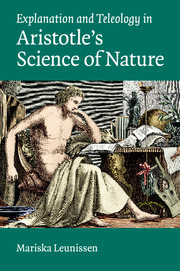Book contents
- Frontmatter
- Contents
- List of figure and tables
- Acknowledgements
- List of abbreviations
- Introduction
- 1 Aristotle's defense of natural teleology: setting the stage for teleological explanations in the Physica
- 2 Aristotle's bio-functional account of the soul: establishing the starting points of teleological explanation in the De Anima
- 3 Introducing biology as a demonstrative science: the theory of teleological explanation in the De Partibus Animalium I
- 4 Explaining parts of animals: the practice of teleological explanation in the De Partibus Animalium II–IV
- 5 Making sense of the heavens: the limits of teleological explanation in the De Caelo
- 6 Aristotle's model of science: formalizing teleological explanations in the Analytica Posteriora
- 7 Conclusion
- Bibliography
- General index
- Index locorum
2 - Aristotle's bio-functional account of the soul: establishing the starting points of teleological explanation in the De Anima
Published online by Cambridge University Press: 07 September 2010
- Frontmatter
- Contents
- List of figure and tables
- Acknowledgements
- List of abbreviations
- Introduction
- 1 Aristotle's defense of natural teleology: setting the stage for teleological explanations in the Physica
- 2 Aristotle's bio-functional account of the soul: establishing the starting points of teleological explanation in the De Anima
- 3 Introducing biology as a demonstrative science: the theory of teleological explanation in the De Partibus Animalium I
- 4 Explaining parts of animals: the practice of teleological explanation in the De Partibus Animalium II–IV
- 5 Making sense of the heavens: the limits of teleological explanation in the De Caelo
- 6 Aristotle's model of science: formalizing teleological explanations in the Analytica Posteriora
- 7 Conclusion
- Bibliography
- General index
- Index locorum
Summary
INTRODUCTION
Aristotle introduces his investigation of the soul in De Anima as being among the primary kinds of knowledge, on account of both its accuracy and its dealing with better and more wonderful things (DA I.1, 402a1–5). Knowledge of the soul contributes especially to natural philosophy (DA I.1, 402a6–7; cf. DA I.1, 403a27–28), because the soul is “a sort of1 principle of living beings” (DA I.1, 402a8: ἔστι γὰρ οἷον ἀρχὴ τῶν ζῴων) and living nature represents Aristotle's concept of nature in the fullest sense.2 For Aristotle, then, the study of the soul and its embodiment is the starting point of biology,3 and as such forms an important part of his broader investigation into nature.
The issues Aristotle sets out to address in De Anima are, first, the nature and essence of the soul and, second, the soul's attributes – both the ones proper to the soul and the ones living beings have in virtue of having a soul (DA I.1, 402a8–11). This program leads Aristotle, among others, into investigations of the ontological status of the soul and its parts, of the relation between the body and the soul, and of the various capacities of the soul that living beings share. In this chapter, sidestepping many of the difficulties in the interpretation of this treatise, I shall focus rather narrowly on Aristotle's bio-functional analysis of the soul, i.e.
- Type
- Chapter
- Information
- Publisher: Cambridge University PressPrint publication year: 2010



